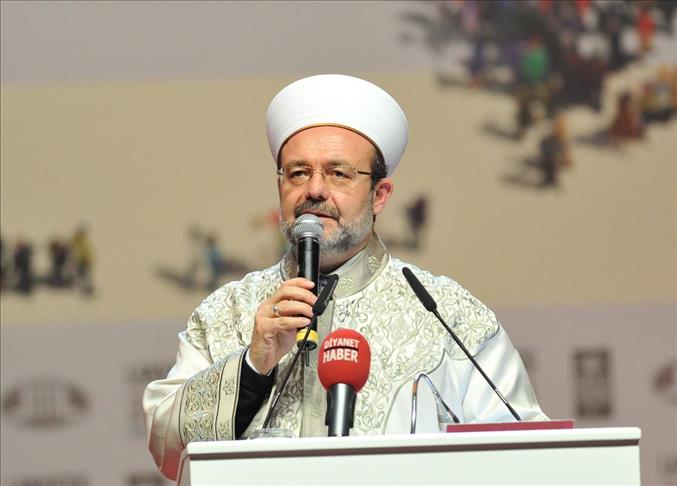
HATAY, Turkey
Turkey's head of religious affairs, Mehmet Gormez, has criticized Pope Francis’s description of the 1915 incidents as “genocide".
Gormez said in Hatay on Monday: "It is upsetting that political lobbies and PR firms around the world have extended [their activities] to religious institutions' rites and prayers.
"If societies start to interrogate each other over past sorrows, the Vatican will suffer more than anyone else."
Pope Francis said on Sunday that “the first genocide of the 20th century” had struck Armenians in a statement which led Turkey to recall its ambassador in Vatican and also summon Vatican's envoy in Ankara.
The Pope made the remarks during Mass in the Armenian Catholic rite at the St. Peter's Basilica, which Armenian President Serzh Sargsyan also attended.
'Slander and discrimination'
Gormez also expressed his "sorrow" over the Pope's remarks, which he described as "baseless claims".
Armenians are preparing to commemorate the 100th anniversary of the 1915 incidents on April 24.
Turkey's Parliament Speaker Cemil Cicek also condemned Pope Francis' remarks on Monday, describing them as "slander" and "discrimination".
"It is a statement which provokes political discrimination, racism and hate speech," Cicek said.
Apology demanded
The 1915 events took place during World War I when a portion of the Armenian population living in the Ottoman Empire sided with the invading Russians and revolted against the empire.
The Ottoman Empire relocated Armenians in eastern Anatolia following the revolts and there were Armenian casualties during the relocation process.
Armenia has demanded an apology and compensation, while Turkey has officially refuted Armenian allegations over the incidents saying that, although Armenians died during the relocations, many Turks also lost their lives in attacks carried out by Armenian gangs in Anatolia.
The Turkish government has repeatedly called on historians to study Ottoman archives pertaining to the era in order to uncover what actually happened between the Ottoman government and its Armenian citizens.
'Great tragedy'
The debate on “genocide” and the differing opinions between the present day Turkish government and the Armenian diaspora, along with the current administration in Yerevan, still generates political tension between Turks and Armenians.
Turkey's official position against allegations of “genocide” is that it acknowledges the past experiences were a great tragedy and that both parties suffered heavy casualties, including hundreds of Muslim Turks.
Ankara agrees that there were certainly Armenian casualties during World War I, but says that it is impossible to define these incidents as “genocide.”
In 2014, then Turkish Prime Minister Recep Tayyip Erdogan expressed his condolences for the first time to all Ottoman citizens who lost their lives in the events of 1915.
"May Armenians who lost their lives in the events in the early twentieth century rest in peace, and we convey our condolences to their grandchildren," Erdogan said.
Anadolu Agency website contains only a portion of the news stories offered to subscribers in the AA News Broadcasting System (HAS), and in summarized form. Please contact us for subscription options.

